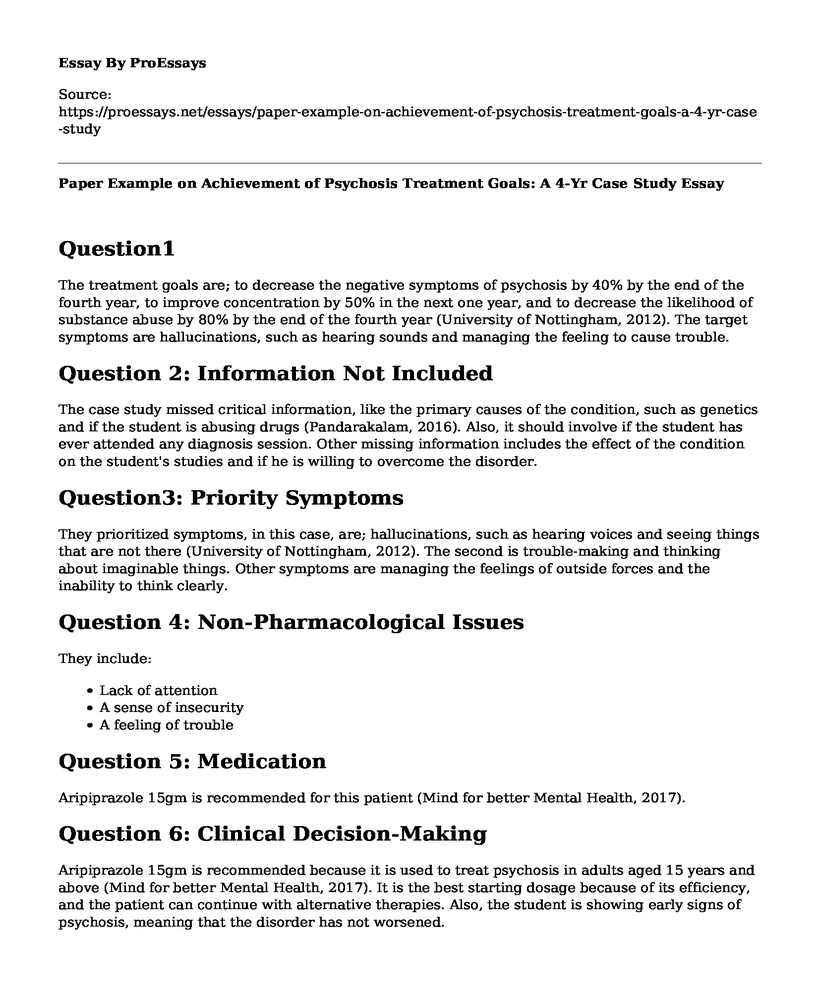Question1
The treatment goals are; to decrease the negative symptoms of psychosis by 40% by the end of the fourth year, to improve concentration by 50% in the next one year, and to decrease the likelihood of substance abuse by 80% by the end of the fourth year (University of Nottingham, 2012). The target symptoms are hallucinations, such as hearing sounds and managing the feeling to cause trouble.
Question 2: Information Not Included
The case study missed critical information, like the primary causes of the condition, such as genetics and if the student is abusing drugs (Pandarakalam, 2016). Also, it should involve if the student has ever attended any diagnosis session. Other missing information includes the effect of the condition on the student's studies and if he is willing to overcome the disorder.
Question3: Priority Symptoms
They prioritized symptoms, in this case, are; hallucinations, such as hearing voices and seeing things that are not there (University of Nottingham, 2012). The second is trouble-making and thinking about imaginable things. Other symptoms are managing the feelings of outside forces and the inability to think clearly.
Question 4: Non-Pharmacological Issues
They include:
- Lack of attention
- A sense of insecurity
- A feeling of trouble
Question 5: Medication
Aripiprazole 15gm is recommended for this patient (Mind for better Mental Health, 2017).
Question 6: Clinical Decision-Making
Aripiprazole 15gm is recommended because it is used to treat psychosis in adults aged 15 years and above (Mind for better Mental Health, 2017). It is the best starting dosage because of its efficiency, and the patient can continue with alternative therapies. Also, the student is showing early signs of psychosis, meaning that the disorder has not worsened.
Question 7: Laboratory Testing/Monitoring For Safely Prescribing the Drug
The healthcare professional must examine the level of blood glucose in the patient to ascertain if it meets the standards levels. Additionally, the health professional must obtain and monitor baselines of waist circumference, fasting plasma glucose, and fasting lipids (Mind for better Mental Health, 2017). The data would help to examine the potential side effects of the drug on the patient before switching to another drug.
Question 8: Safety Issues
Safety issues associated with Aripiprazole 15gm include blurred vision that would cause accidents if the patient continues to drive (Mind for better Mental Health, 2017). The patient might find trouble when swallowing, choking him. Therefore, the psychiatry should ensure safety conditions when prescribing the drug to the patient.
Question 9: Second Choice of Medication
Chlorpromazine is the second medication (Mind for better Mental Health, 2017). The starting dose is 25mg three times every day.
Question 10: Clinical decision-making
Since the patient is showing early signs of psychosis, such as hallucinations and negative feelings, he should take the medication to act on his central nervous system (Mind for better Mental Health, 2017). It will stabilize his mental ability. Also, the drug is efficient since the client does not suffer from any allergy and is not breastfeeding.
Question 11: Laboratory Testing/Monitoring For Safe Prescription
The laboratory testing and monitoring needed for safe prescription include; testing the number of blood cells of the patients, and measuring blood pressure (Pandarakalam, 2016). Also, the psychiatry needs to understand if the patient has a history of low white blood cells.
Question 12: Safety Issues
The patient should not take alcohol while taking the drug because it reacts with the medicine causing severe problems. For example, it can cause breathing problems (Downs et al., 2018). Secondly, the individual should be careful when driving since the medicine can cause drowsiness, and dizzy, affecting the ability to concentrate on the road.
Question 13: Non-Pharmacologic Interventions
They include:
- Mindfulness-based therapy
- Attention training methods
- Hallucinations focused integrative therapy (Downs et al., 2018)
Question 14: Safety Issues
Trouble-thinking and hearing and seeing things others do not see are the primary safety issues because they can trigger aggressive reactions (Pandarakalam, 2016). The best way to manage trouble-thinking is by engaging in cognitive behavioral therapy to change individual behavior, while participating in hallucinations focused integrative therapy manages the issue of hallucination.
Question 15: When to Follow Up the Patient
The follow-up period will be two weeks after prescribing the drugs. The period would help to closely monitor the reaction of the patients towards the medication prescribed and therapies (Pandarakalam, 2016).
References
Downs, J et al., (2018). Negative Symptoms in Early-Onset Psychosis and Their Association With Antipsychotic Treatment Failure. Schizophrenia Bulletin, 45(1), 69-79
Mind for better Mental Health. (2017). Aripiprazole. Retrieved from: https://www.mind.org.uk/information-support/drugs-and-treatments/antipsychotics-a-z/aripiprazole/#.XY3HC3FRW1s
Mind for better Mental Health. (2017). Chlorpromazine. Retrieved from: https://www.mind.org.uk/information-support/drugs-and-treatments/antipsychotics-a-z/chlorpromazine/#.XY3N-3FRW1s
Pandarakalam, P. (2016). Pharmacological and Non-Pharmacological Interventions for Persistent Auditory Hallucinations in Schizophrenia. British Journal of medical practitioners, 9(2), 1-9.
University of Nottingham. (2012, January, 31). Psychiatric Interviews for Teaching: Psychosis. Retrieved from: https://www.youtube.com/watch?v=ZB28gfSmz1Y&feature=youtu.be
Cite this page
Paper Example on Achievement of Psychosis Treatment Goals: A 4-Yr Case Study. (2023, Feb 11). Retrieved from https://proessays.net/essays/paper-example-on-achievement-of-psychosis-treatment-goals-a-4-yr-case-study
If you are the original author of this essay and no longer wish to have it published on the ProEssays website, please click below to request its removal:
- Essay Sample on Cardiovascular Disease
- Comprehensive Gerontological Assessment Paper Example
- Basic Tenets of Solution Based Therapy - Essay Sample
- Ways in Which Individuals Can Effectively Deal With Developmental Challenges - Essay Sample
- Happiness Can Be Found in Unlikely Circumstances Essay
- Research Paper on Counselling: Success & Challenges of Different Approaches
- Essay Example on Dad Suing School Board After Daughter's Suicide on School Trip







